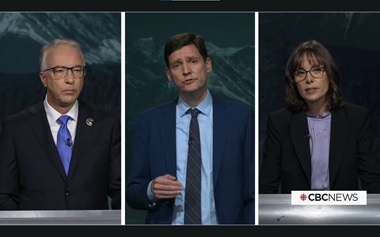
BC Conservative Leader John Rustad, BC NDP Leader David Eby and BC Green Party Leader Sonia Furstenau during the October 8 party leaders’ debate.
On the eve of the Thanksgiving long weekend, I was waiting in the early morning ferry line up in Snug Cove, making my usual way from Bowen Island to UBC when someone knocked on my car window.
A little startled, I rolled down the window and saw an older woman with a warm smile, bundled up in a toque and warm sweater. She thrust a campaign flyer for the local Green Party candidate into my car and invited me to vote in the upcoming British Columbia provincial election.
In a winsome and compelling manner, she hit the highlights on why her candidate (and party) were the preferred option for our community, working through her elevator speech on how our daily life would be enhanced (perhaps blessed?) by casting my vote in the right direction. After a few moments of chat, she then took her smile and early morning evangelistic appeal further up the hill to knock on another neighbour’s car window.
As I rolled onto the ferry, several thoughts went through my head. I was appreciative of the woman’s grit and determination to be up early in the morning to speak to total strangers about the benefits of her candidate and party for our wider community.
Election, as Christians
I also wondered if, as a Christian, I could articulate as clearly the impact of the local church on a particular community – especially without the benefit of several cups of coffee that early in the morning. Of course, the Christian tradition speaks of ‘election’ as a way of describing God’s choice for humanity through the covenant with Israel and Jesus Christ.
Theologically speaking, an elevator speech for election is an invitation for us to claim our place in the world by reflecting together on what Jesus saves us from, and what he saves us for.
Will Willimon reflected a few years ago in his book How Odd of God: Chosen for the Curious Vocation of Preaching that election is God’s vocational assignment of something for us to do and be in history.
He writes:
In Jesus Christ we know God’s intentions for us, though we don’t know what ultimate difference our acknowledgement or failure to acknowledge, our yes or no, our belief or inability to believe, our choices or lack thereof, mean for our eschatological existence. God’s Word to us is God’s will for us.
As Christians, election reminds us of the gracious, saving presence of God in the world.
Wider blessing?
So, what does it mean to be chosen by God as a human being, and rooted in a covenant people? What potential for positive impact and blessing does that provide for the sake of the wider community? Is there evidence of this wider blessing from our theological understanding of election in the communities where we live, work and play?
If our ‘savedness’ is not for us to simply revel in, but rather is a call to serve the world Christ died to save and that God loves so dearly, what practical implications flow from that commitment? How then are Christians called and equipped by God to be a transformative presence in the world?
Canadian born, Chicago based missiologist David Fitch recently wrote:
The transformation of culture will not come from better politicians, more effective social justice activists or the premier intellectuals of our day.
He continued:
True transformation emanates from the persistent local community organizers, who shape communities to live differently. It is these social spaces that disrupt oppressive systems, rather than make minor tweaks within them. In my opinion, the churches of Jesus Christ should be the ultimate community organizers of social revolution.
Blessings and responsibilities
In missional theology, election celebrates this free act of God in Jesus Christ for the world, and acknowledges that the goal of election is the creation of a people of God and not merely the salvation of solitary individuals or the privileging of particular nations or ethnic groups.
Election is both about the blessings and responsibilities of life in the new community of God’s own making that we call the church. Election is the expression of God’s will to create a community that serves and glorifies God. By understanding our common life together as being ‘saved to be sent’ it is perhaps like a baseball coach both affirming the giftedness of a player and handing out their assignment for the game – sometimes left field, sometimes second base, sometimes warming up the pitcher.
Our savedness is not a passive activity, but rather the spiritual assurance of a place within God’s saving economy at work in the world through the power of the Spirit.
Missiologist Lesslie Newbigin summarized election in The Gospel in a Pluralistic Society by stating that:
To be chosen, to be elect, therefore does not mean that the elect are the saved and the rest are the lost. To be elect in Christ Jesus, and there is no other election, means to be incorporated into his mission to the world, to be the bearer of God’s saving purpose for his whole world, to be the sign and the agent and the first fruit of his blessed kingdom which is for all.
Newbigin was realistic about the limitations of the church as a human institution, but clear on what it meant to be God’s elect when he wrote:
It means that this particular body of people who bear the name of Jesus through history, this strange and often absurd company of people so feeble, so foolish, so often fatally compromised with the world, this body with all its contingency and particularity, is the body which has the responsibility of bearing the secret of God’s reign through world history.
The logic of election is all of one piece with the logic of the gospel. God’s purpose of salvation is not that we should be taken out of history and related to him in some way which bypasses the specificities and particularities of history. His purpose is that in and through history there should be brought into being that which is symbolized in the vision with which the Bible ends – the Holy City into which all the glory of the nations will finally be gathered.
A reconciling presence
This week British Columbians go to the polls in a provincial election. We pray that candidates of good will and keen social impact will be selected to represent all of us in the Legislature in Victoria.

Ross Lockhart
Christians have a long and effective history of public service through western democratic process. But this moment also gives us pause, to remind us theologically that election speaks to a much deeper and eternal question of how we as a covenanted, chosen community of Christ followers live out the evolving and emerging mission of God to reconcile what is broken, heal what is hurting and witness to the kingdom that is coming, and by grace is present already in this world.
Rev. Dr. Ross A. Lockhart is Dean of St. Andrew’s Hall, the Presbyterian Church in Canada college on the campus of The University of British Columbia.
He has written this comment as a member of The Bell: Diverse Christian Voices in Vancouver. Go here to see earlier comments in the series.

Thank you for these insights, Ross. Your quote from David Fitch immediately reminded me of the work of ‘One City Peterborough,’ whose Executive Director is Anglican Deacon Christian Harvey. Christian was a keynote speaker at our national gathering of Anglican and Lutheran deacons at Sorrento Centre this past June.
One City is an example of the broader transformative work Christians can be involved in. As an Anglican deacon who has worked with the Metro Vancouver Alliance, I also see that coalition as an opportunity for Christians to have an enhanced presence in our social and cultural networking.
I suggest readers have a look at One City’s website, and MVA’s website.